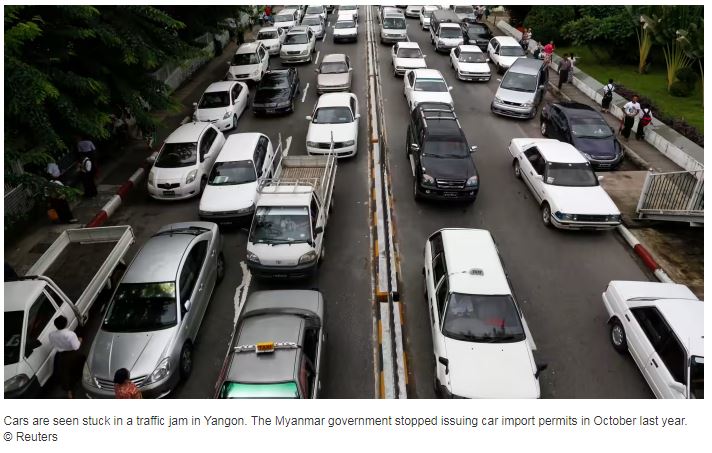Myanmar targets car and luxury imports in foreign-currency crunch
BANGKOK — Myanmar has stepped up import controls by banning imports of cars and other nonessential goods as the country struggles with a severe foreign-currency shortage caused by declines in investment and assistance from overseas.
Myanmar athletes who competed in the Southeast Asian Games in Vietnam last month were surprised by an unusual announcement last week from the Ministry of Transport and Communications: Gold medalists would be rewarded with permits to import cars.
The permits became that much valuable after the authorities stopped issuing them in October 2021. Under previous military rulers, they were used to reward figures connected to the army. The new military government appears to be taking a page from the old playbook.
The Ministry of Commerce says the import restrictions on luxury items, such as cars, will be temporary, but the move has hit related businesses. Foreign companies that entered Myanmar counting on domestic demand now face uncertain prospects.
“We’ve heard that officials are set to allow imports to resume, but we don’t see any indication of that happening soon,” a source at a Japanese importer of new vehicles said.
Cars are not the only casualty of the government’s frantic efforts to improve its trade balance. Because boosting exports is not easy, the government is cracking down on imports to reduce the trade deficit.
Myanmar required import licenses for 3,931 items before the civilian government was ousted by the military in February 2021. This past May, the tally came to 9,099. The products range from consumer electronics to apparel.
The situation does not seem to be improving. For the two quarters through March, Myanmar reported exports of $8.1 billion and imports totaling $7.9 billion.
But the trade surplus was due largely to reduced capital goods purchases by foreign and domestic businesses. Imports of consumer goods rose 8% from the year-earlier period.
Myanmar has slipped back into a trade deficit since April on such factors as rising fuel prices.
Authorities further tightened trade controls in April. The Foreign Exchange Supervisory Committee now allots foreign currency to imports of essential goods.
This has introduced more red tape into obtaining import licenses. A process that once took a week or so has taken more than a month recently.
Foreign currency is needed to pay for imports of industrial materials. Myanmar authorities allow only currency trades at the official exchange rate pegged about 10% above the floating rate for the kyat, the national currency. This has limited the amount of foreign currency that can be obtained on the market.
Source: https://asia.nikkei.com/Spotlight/Myanmar-Crisis/Myanmar-targets-car-and-luxury-imports-in-foreign-currency-crunch


 Thailand
Thailand




